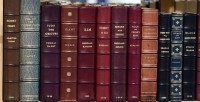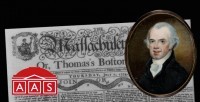The New York Antiquarian Book Fair will enthrall bibliophiles at the Park Avenue Armory from April 9 through 12, 2015. “The Best Book Fair in the World” This three-day event is one of the largest antiquarian book fairs in the United States, and draws over 200 rare book dealers from across the country and around the world. Sponsored by the Antiquarian Bookseller's Association of America and the International League of Antiquarian Booksellers, the event is the centerpiece of Rare Book Week, a “coordinated effort to focus attention on the antiquarian book fairs, book & manuscript auctions, rare book & fine art exhibits, and bookish browsing available in New York City from April 7-15,” according to Fine Books Magazine. Where: Park Avenue Armory, 643 Park Avenue, NY, NY 10065 When: April 9 - 12, 2015 Friday: Noon-8pm Saturday: Noon-7pm Sunday: Noon-5pm Rare Book Week's events include two shadow shows, and numerous exhibitions and auctions of rare books and ephemera around New York City. Featured item: Allen, John Fisk. VICTORIA REGIA; OR THE GREAT WATER LILY OF AMERICA. With a brief account of its Discovery and Introduction into Cultivation: with Illustrations by William Sharp, from Specimens Grown at Salem, Massachusetts, USA. Boston: Printed and published for the author, 1854. A cornerstone of American color printing. These images were drawn on stone and printed by Sharp, America's first chromolithographic printer. This was the earliest example of large scale color print... [more New York Antiquarian Book Fair 2015]
The Antiquarian Booksellers' Association of America are pleased to announce the 2015 National Collegiate Book Collecting Contest! Established in 2005 by Fine Books & Collections Magazine to recognize outstanding book collecting efforts by college and university students, the contest aims to encourage young collectors to become accomplished bibliophiles. The magazine conducted the annual competition program for three years before turning over leadership to a collaboration of institutional partners (The Antiquarian Booksellers' Association of America (ABAA), the Fellowship of American Bibliophilic Societies (FABS), and the Center for the Book and the Rare Books and Special Collections Division of the Library of Congress, with major support from the Jay I. Kislak Foundation. Competitions are held at more than three dozen colleges and universities across the United States. Some contests have been conducted for decades, dating back to Swarthmore College's first competition in the 1920s. All college or university prizewinners are encouraged to enter. Student collectors whose institutions do not offer a book collecting contest also may enter. All entries for the 2015 competition must be submitted by May 31, 2015. Full rules and details can be found at https://www.abaa.org/ncbcc/the-national-collegiate-book-collecting-contest... [more 2015 National Collegiate Book Collecting Contest]
People tend to get carried away by the romance of old books and paper, and it's easy to see why. The thrill of the hunt, the joys of discovery, and the marvelous stories locked up in dusty old letters, journals, and books provide a perfect escape – an antidote to the stresses of our daily lives. Unfortunately, overworked librarians and book dealers often find that their interaction with books and manuscripts devolves into an insistent time/money proposition. As much as we'd like to linger over an ancient text, or just sit down and read the damned thing, we've got to get that bugger cataloged and shelved. There's work to be done! We wind up stressing out over the very things that should be affording us relief. So it's a delight when, every once in a while, something comes along that is so arresting and charismatic that it commands our complete attention and gobbles up our time, productivity be damned. I came across just such a lot on my way to the Washington Book Fair ten days ago, and I'm happy to report that this material has been holding me hostage all week. The lot consists of thirty or so nineteenth century sea charts. They're all in good condition, and they're certainly marketable, so they merited some individual attention. Naturally, the closer I looked, the more interesting they became. Many of them bore pencil markings of courses sailed, of dates, of sailing directions, and of notes about navigational sight lines and hazards. On closer inspection the dates grouped a... [more Carried Away]
You Know You're a Serious Book Collector When . . . The insurance value of your book collection is greater than the value of your home. You will skip watching any sporting event to attend a Book Fair. You have a separate credit card just for book purchases. The high balance on your book credit card “doesn't really count." You fantasize more about books than the opposite sex. You realize you may never see that rare book again but you can always make more money. You sell your piano to make room for another large bookcase. You can't wait to get the kids out of the house so you can use their rooms for books. You quietly worry about the structural integrity of your home. You can scout bookstores all day long and forget to eat. You have a tumultuous relationship with your postman. Most of the emails you receive are “want matches” from book sites. Much of your day revolves around checking these want matches. You often have books sent to the office instead of your home. Book dealers send you advance catalogues. Book dealers extend you credit. Book dealers take you to lunch. Auction houses send you complimentary catalogues. You have experienced auction fever. You can spend hours going through dealer pamphlet bins for fun. You examine the decorative books at furniture stores in hopes of a find. Guests grow silent in amazement when they walk through your book-laden home. Your master bedroom is full of books. You have book shelves in your bedroom closets. A library space is the mos... [more You Know You’re a Serious Book Collector When…]
Chris Bohjalian is the author of 17 books, including three historical novels, Skeletons at the Feast, The Light in the Ruins, and The Sandcastle Girls. He has received numerous awards for his fiction, as well as the ANCA Freedom Award for educating Americans about the Armenian Genocide. Rich Rennicks spoke with Chris Bohjalian about book collecting, his much-loved first edition of To Kill a Mockingbird, how his mother's passion for literature helped shape his later career as an author, the research behind his books, and how an unpublished WWII diary informed his first historical novel. ABAA: Do you think of yourself as a book collector? Chris Bohjalian: I love old books, but I wouldn't say I'm an old book collector. There are certain books that have been in my family since I was a boy and that matter to me greatly. To Kill a Mockingbird is one of those books, Night of Camp David by Fletcher Knebel is another and The Old Man and the Sea is another. Those are books that were my mother's. The sort of old books that I collect tend to be books by Scott Fitzgerald, I have at least nine different editions of The Great Gatsby, at least four different editions of The Beautiful and the Damned. My favorite editions of The Great Gatsby are the pulp paperback editions from the 1950s -- not especially valuable, but great fun. I have one particular edition, a Bantam paperback, and Gatsby looks just like George Clooney. Jay Gatsby as a George Clooney lookalike? You be the judge. I'm an Armen... [more An Interview with Chris Bohjalian]
Leah Dobrinska of ABAA member Books Tell You Why, Inc. discusses the founding of the American Antiquarian Society by revolutionary and pioneering printer Isaiah Thomas, and suggests some other organizations collectors should familiarize themselves with... Isaiah Thomas was a patriot and a printer. His work as a publisher antagonized the British presence in the colonies, and he was the first to proclaim the Declaration of Independence in the state of Massachusetts. Furthermore, Thomas' research on the printing process and his subsequent library of titles formed the basis for what is now the American Antiquarian Society (AAS), one of the major organizations dedicated to book collectors and history enthusiasts alike. Arguably, Thomas' legacy can be seen in both the AAS and in the other organizations which have taken up the torch of championing book collectors and their fervor for rare and authentic written works. During the Revolutionary War, Isaiah Thomas fought as a minuteman in the Battles of Lexington and Concord. At the same time, he used his position as the premiere printer in the colonies to fight the British cause with his issued works. Thomas published The Massachusetts Spy, a weekly magazine which supported the Whig cause and later George Washington and his federalist party. The British government tried to disband the paper, causing Thomas to move his headquarters from Boston to Worcester in 1775. It was there where he spent the remainder of his years as a printer, and... [more Isaiah Thomas and the American Antiquarian Society]
We round up interesting stories about the rare book world being discussed this week. Shakespeare's First Folios Go on Tour The Folger Shakespeare Library has anounced the cities that are getting a First Folio as part of their ambitious plan to put a copy of Shakespeare's First Folio on display in every state, Washington D.C., and Puerto Rico, in 2016. Read more to discover where your nearest First Folio will be... Preview Rare Book Week Look forward to Rare Book Week (which includes the 55th Annual New York Antiquarian Book Fair) with this preview from Rare Book Magazine. ILAB to Mark World Book Day The International League of Antiquarian Booksellers are planning a series of Pop-Up Book Fairs around the world to mark UNESCO World Book Day on April 23. Many ABAA members are involved in the US events. Ephemera Society Annual Conference The Ephemera Society Annual Conference is coming up. Mark your calendars for March 20-22, 2015. Documentary: Inside the Harvard Depository Harvard maintains a huge book depository that few ever get to visit. Curious collectors can now take a virtual step inside this hidden library in a new documentary, Cold Storage, a digital offshoot of the Library Beyond the Book project by Jeffrey T. Snapp and Matthew Battles. Read more... William Morris Library Project Reaches Half-Way Stage The project to digitally catalog the legendary library of book collector and publisher William Morris (of Kelmscott Press fame) has passed the half-way mark. Unknown Copy... [more Rare Book News]
Along with robins and daylight savings time, the Washington Antiquarian Book Fair is the harbinger of spring. In the old days, I'd drive down to the house of my friends who run Bartleby's Books, park my car in their driveway, and take a long, pleasant, shirtsleeved walk down Wisconsin Avenue to their shop in Georgetown, delighting in forsythias, daffodils, and short dresses along the way. But their shop has been closed for four years, and it's a good thing, too. Their business is thriving at home, and I would have needed skis to make the walk this year. As it was, finding our way across the Key Bridge to site of the book fair at the Holiday Inn in Roslyn, VA, was an arctic excursion, fraught with ice patches, snow banks and potholes. Promoter Beth Campbell and her helpful staff made move in a snap, but no one was too surprised that the line on opening night was shorter than usual. We'd just gotten several inches of snow – a blizzard in these parts – and DC officials were encouraging people to stay off the roads so that street cleaning could proceed. A word about Beth Campbell and the Washington Antiquarian Book Fair, if you will indulge me... The fair started as a fund raising event for Concord Hill School forty years ago. In its day it was, along with events in New York, Seattle, and St. Petersburg, one of the most successful provincial shows in the country. A bookseller could – and many did – make a decent living shuttling from one of these events to the next. All ... [more Frozen: Washington Antiquarian Book Fair]
The Petaluma Branch of the Sonoma County Library discovered that an "old and irreplaceable map has disappeared from collection". It is the 1852 'Map of Lands of Petaluma', and probably is the original plat map from the first survey of the settlement. The map is similar to this one held by UC Berkeley: http://content.cdlib.org/ark:/13030/hb8779p17c/ If you know its whereabouts, please contact Kate Keaton at kkeaton@sonoma.lib.ca.us. [more Missing: 1852 Map of Lands of Petaluma]
Measuring Your Social Media Success Whether you are just beginning your magical foray into the world of social media or have been tweeting for years, there comes a time when we all stop and wonder, “Is this thing on?” In other words, how can you tell if your posts are actually reaching anyone and generating more traffic to your website or just echoing back at you? For newbies and old hands alike, it is always a good idea to review your social media efforts to see what is working and where you can improve. Today we will consider some easy ways to get more mileage out of your daily posts and take a look at some powerful tools that can give you access to the data sets of your dreams... brace yourselves. Measuring your social media success can be as simple as becoming more mindful of your interactions with other users. One easy way to gauge your progress is to look at the number of engagements your posts are receiving. If you are on Facebook, are people consistently liking or commenting on your content? If you are more Twitter-inclined, are people re-tweeting your posts? Is there steady growth in the number of engagements and followers on your social media platforms or has that number been stagnant as of late? If your social media game needs a face-lift, here are a few tried and true methods to get back on track: 1. Use images. It is proven that posts that include visual material garner more likes, comments, and shares. Use this to your advantage. Not every post needs to incl... [more THE SAVVY BOOKSELLER: Social Media for the Antiquarian Book Trade, Post #7]










